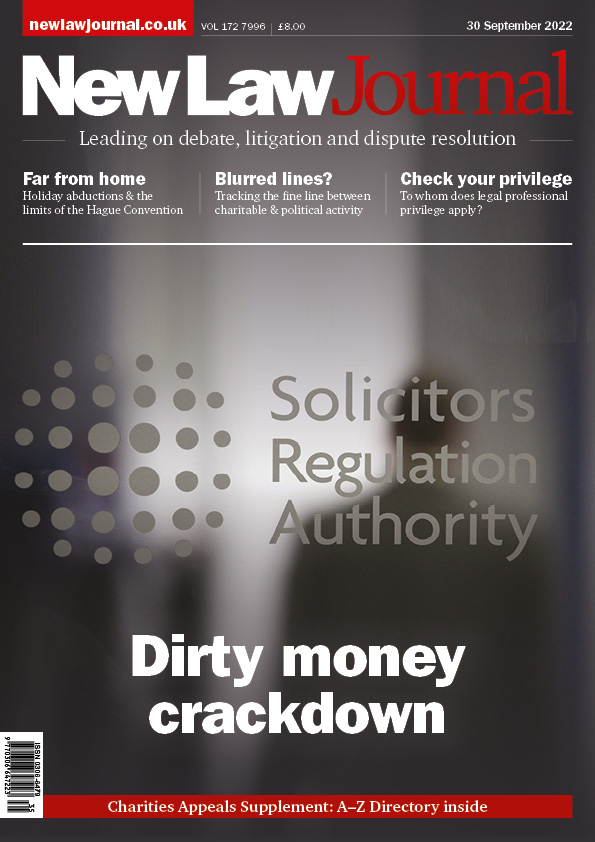THIS ISSUE

NLJ's latest Charities Appeals Supplement has been published in this week's issue
Beware of glass cubes, or at least those who intend to build them, warns former District Judge Stephen Gold, in this week’s 'Civil way'.
When does legal professional privilege apply? That was the nub of the issue in the recent case of Loreley Financing (Jersey) v Credit Suisse. Writing in this week’s NLJ, Rhys Novak and Emilie Brammer look into the details of the case and assess the two-stage test set out by the High Court.
In the second in a series of articles in NLJ on child abductions, Mani Singh Basi looks at cases where children go on holiday and are not returned home.
Judges are responding to recent examples of judgment embargoes being breached by imposing conditions on parties, according to Mary Young and Rebecca Ryan in this week’s NLJ.
Solicitors are prime targets for those who want to wash their ‘dirty’ money, says Paul Philip
Mani Singh Basi examines the benefits & limitations of the Hague Convention in child abduction cases
Mark Pawlowski asks whether it is time to reconsider the line between charity & political activities
Can the identity of those instructing lawyers be protected by privilege? Emilie Brammer & Rhys Novak assess the two-stage test set out by the High Court
Masood Ahmed examines the court’s approach to a party’s non-attendance at trial, & the high bar for applications to set aside the resulting judgment
MOVERS & SHAKERS

NLJ Career Profile: Ken Fowlie, Stowe Family Law
Ken Fowlie, chairman of Stowe Family Law, reflects on more than 30 years in legal services after ‘falling into law’

Jackson Lees Group—Jannina Barker, Laura Beattie & Catherine McCrindle
Firm promotes senior associate and team leader as wills, trusts and probate team expands

Asserson—Michael Francos-Downs
Manchester real estate finance practice welcomes legal director
NEWS
Children can claim for ‘lost years’ damages in personal injury cases, the Supreme Court has held in a landmark judgment
The Supreme Court has drawn a firm line under branding creativity in regulated markets. In Dairy UK Ltd v Oatly AB, it ruled that Oatly’s ‘post-milk generation’ trade mark unlawfully deployed a protected dairy designation. In NLJ this week, Asima Rana of DWF explains that the court prioritised ‘regulatory clarity over creative branding choices’, holding that ‘designation’ extends beyond product names to marketing slogans
From cat fouling to Part 36 brinkmanship, the latest 'Civil way' round-up is a reminder that procedural skirmishes can have sharp teeth. NLJ columnist Stephen Gold ranges across recent decisions with his customary wit
Digital loot may feel like property, but civil law is not always convinced. In NLJ this week, Paul Schwartfeger of 36 Stone and Nadia Latti of CMS examine fraud involving platform-controlled digital assets, from ‘account takeover and asset stripping’ to ‘value laundering’
Lasting powers of attorney (LPAs) are not ‘set and forget’ documents. In this week's NLJ, Ann Stanyer of Wedlake Bell urges practitioners to review LPAs every five years and after major life changes







